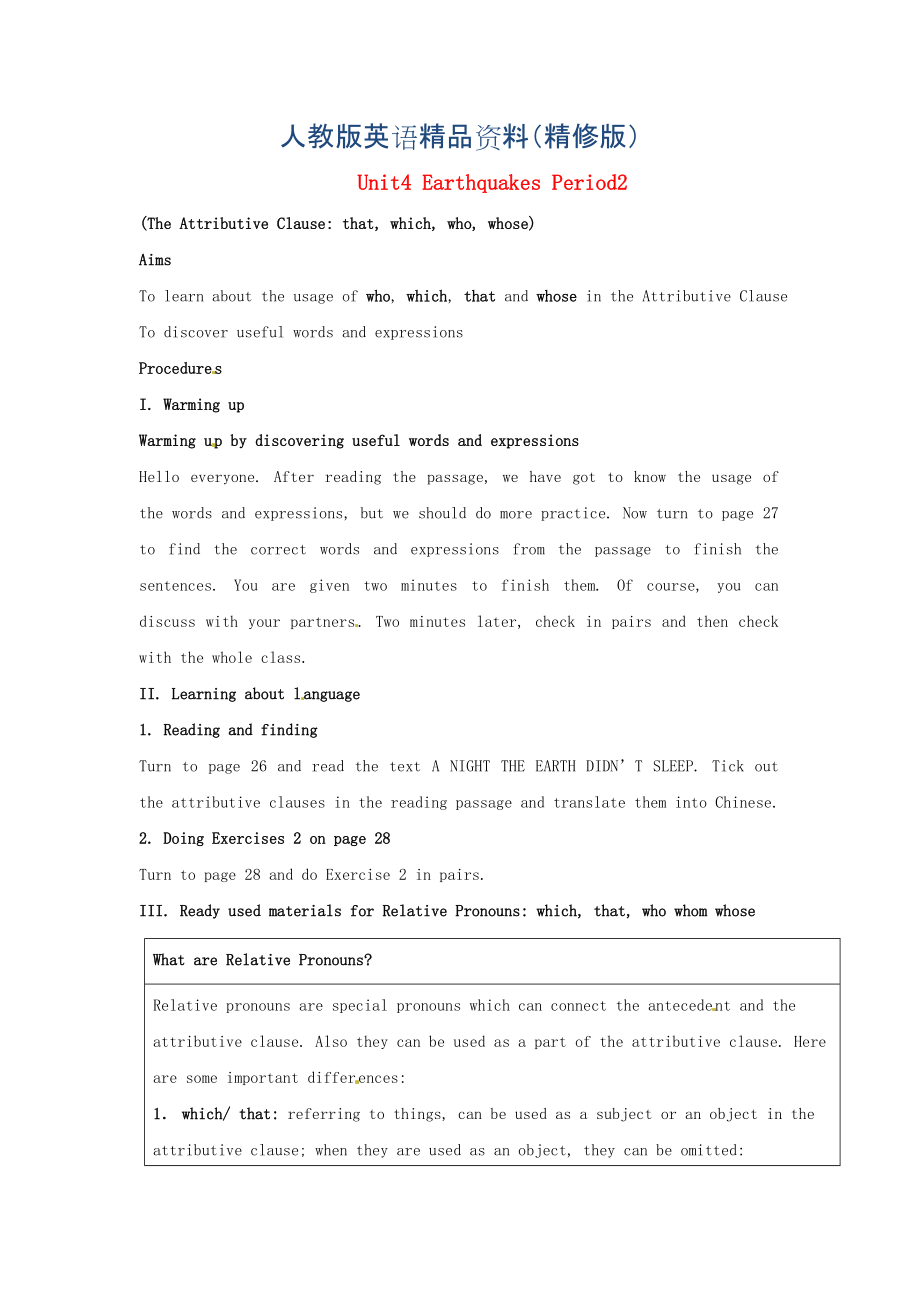《湖南省師范大學(xué)附屬中學(xué)高中英語(yǔ) Unit4 Earthquakes Period2教案 人教版必修1精修版》由會(huì)員分享�����,可在線(xiàn)閱讀�,更多相關(guān)《湖南省師范大學(xué)附屬中學(xué)高中英語(yǔ) Unit4 Earthquakes Period2教案 人教版必修1精修版(3頁(yè)珍藏版)》請(qǐng)?jiān)谘b配圖網(wǎng)上搜索。
1�、人教版英語(yǔ)精品資料(精修版)
Unit4 Earthquakes Period2
(The Attributive Clause: that, which, who, whose)
Aims
To learn about the usage of who, which, that and whose in the Attributive Clause
To discover useful words and expressions
Procedures
I. Warming up
Warming up by discovering useful words and expre
2、ssions
Hello everyone. After reading the passage, we have got to know the usage of the words and expressions, but we should do more practice. Now turn to page 27 to find the correct words and expressions from the passage to finish the sentences. You are given two minutes to finish them. Of course,
3����、you can discuss with your partners. Two minutes later, check in pairs and then check with the whole class.
II. Learning about language
1. Reading and finding
Turn to page 26 and read the text A NIGHT THE EARTH DIDN’T SLEEP. Tick out the attributive clauses in the reading passage and translate the
4、m into Chinese.
2. Doing Exercises 2 on page 28
Turn to page 28 and do Exercise 2 in pairs.
III. Ready used materials for Relative Pronouns: which, that, who whom whose
What are Relative Pronouns?
Relative pronouns are special pronouns which can connect the antecedent and the
attributive clau
5��、se. Also they can be used as a part of the attributive clause. Here
are some important differences:
1. which/ that: referring to things, can be used as a subject or an object in the
attributive clause; when they are used as an object, they can be omitted:
The plane is a machine that/which can
6��、fly.
The school (that/which) he visited last week is to the south of the city.
1. that/ who/whom: referring to a person, can be used as subject or object in the
attributive clause; whom can be used as an object:
The girl (that/whom/who) we saw yesterday was Jim’s sister.
The man that/who is ta
7����、lking to my father is my maths teacher.
3. whose: referring to a person or a thing, can be used as an attribute in the
attributive clause:
This is the writer whose name is known all over the world.
The room whose window faces south is mine.
4.Before everything, anything, everybody, anybody, al
8、l, the best +n, the
fifth +n, we use that instead of which:
All (that) I need is time.
This is the largest factory (that) I have ever visited
The sixth lesson (that) we are learning is the most difficult in Book Two.
5. We can’t use that in a Non-Defining Attributive Clause:
I have lost the
9���、pen, which I like very much.
I have two sisters, who are both teachers.
IV. Closing down by doing a quiz
Now you are going to take a quiz on Relative Pronouns.
Fill in the blanks, using which, that, who, whom, whose.
(1) The force ( ) causes everything to fall towards the ground is called grav
10�、ity.
(2) A friend ( ) helps you in time of need is a friend indeed.
(3) Do you know the girl ( ) parents are teachers in our school?
(4)The woman ( ) I spoke to just now is my English teacher.
(5) He saw a house ( ) windows were all broken.
(6)Everything ( ) can be done today mustn’t be d
11���、one tomorrow.
(7)Can you think of anyone ( ) could look after him?
(8)This is the best hotel ( ) I know.
(9)The man ( ) I saw told me to come back today.
(10)Those ( ) want to go to the Great Wall write down your names here.
(11) He talked a lot about the teachers and the schools ( ) he h
12�����、ad visited.
(12)The ninth lesson ( ) we are learning is the most difficult in Book One.
(13)Mount Blanc(勃朗峰), ( ) they visited last month, is the highest mountain in Europe.
(14)We know all the teacher ( ) work in our school.
(15)The house in ( ) Lu Xun once lived is a museum now.
(16)The
13�����、house ( ) Lu Xun once lived is a museum now.
(17)The house ( ) Lu Xun once lived in is a museum now.
(18)You can take any room ( ) you like.
(19) He showed a machine ( ) parts are too small to be seen.
(20)The sports meet was put off, ( ) was exactly what we wanted.
Answers to the exercises: (1)which/that (2)who/that (3)whose (4)whom/that/who (5)whose (6)that (7)that (8)that (9)that/whom/who (10)who (11)that (12)that (13)which (14)that (15)which (16)in which/where (17)which/that (18)that (19)whose (20)which
 湖南省師范大學(xué)附屬中學(xué)高中英語(yǔ) Unit4 Earthquakes Period2教案 人教版必修1精修版
湖南省師范大學(xué)附屬中學(xué)高中英語(yǔ) Unit4 Earthquakes Period2教案 人教版必修1精修版

